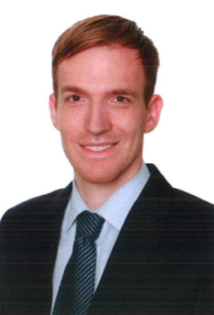We are particularly pleased that the Willy Messerschmitt Prize, endowed with 5,000 euros, for the best dissertation related to aero- and astronautics will again be awarded in 2019 to a former Ph.D. student of the Thermodynamics Institute, although the institute sees itself primarily positioned in the thermofluiddynamic fundamentals. The staff of the Thermodynamics Institute congratulates Tobias Hummel on this great success.
Tobias Hummel's dissertation deals with high-frequency thermoacoustic oscillations in lean premixed combustion systems, an important topic in the development of future gas turbines. The continuing rapid increase in the efficiency of combined cycle power plants from 60% in 2010 to 65% in the next decade and 67% in the foreseeable future will lead to a steep rise in combustion temperatures, requiring new combustion technologies with perfect premixing and reduction of the residence time important for nitrogen oxide formation to the kinetically controlled minimum. This represents a technological leap forward in gas turbine combustion technology for gaseous fuels, leading away from the large swirl burners used since the invention of the stationary gas turbine. Currently, two strategies are competing with each other: the first one attempts to replace the classic large swirl burners with a large number of smaller turbulent jet burners arranged in groups, while the second strategy is based on an even more radical transition from deflagrative to partial auto-ignition flame stabilization with axial fuel and air staging.
So far, surprisingly little information is available on flame stability and dynamics in gas turbine burners in the high frequency range. This is true for combustion chambers with classical jet burners and even more so for the novel combustion chambers of the future. Such instabilities are much less researched than low and medium frequency instabilities, as their occurrence is closely associated with modern and future high-temperature combustion systems. In particular, at the beginning of Tobias Hummel's work there was an almost complete lack of methods for the quantitative calculation of high-frequency instabilities in gas turbine combustion chambers. This situation was extremely unfortunate for the gas turbine industry as the available thermoacoustic development tools for low and medium frequency instabilities cannot be used in the high frequency range, which is characterized by the same order of magnitude of the length scales of combustion and acoustics. Local interactions between the flame and the acoustic field must therefore be taken into account, which makes the problem much more complex.
The aim of Tobias Hummel's theoretical-numerical research was to close this gap. The central research focus of his work is the investigation of high-frequency thermoacoustic oscillations in swirl-stabilized gas turbine burners from a model and analytical point of view. Tobias Hummel was to provide a comprehensive modelling and analysis tool for thermoacoustic oscillations in gas turbine combustion chambers as an extension of the tools available in industry for the acoustically non-compact regime. This requires a time-efficient calculation of system analysis to (1) enable the use within iterative design processes in combustion chamber design, (2) to ensure the applicability to three-dimensional geometries with complex turbulent flow fields representative for industrial gas turbine combustors, and (3) to achieve universal applicability for all basic types of gas turbine combustors.
In the first step, the focus was on linear thermoacoustic phenomena that can be modeled and analyzed in the frequency space. Then nonlinear phenomena were considered, which require a computational environment for modeling and analysis in the time domain. Finally, the third research objective of Tobias Hummel's dissertation was to generate new theoretical knowledge on high frequency thermoacoustic oscillations in gas turbine combustors by applying the developed tools to technically relevant problems.
The list of award winners from the Institute since 2008 is as follows:
2008 Dr.-Ing. Jutta Pieringer
2013 Dr.-Ing. Jannis Gikadi
2016 Dr.-Ing. Thomas Fiala
2018 Dr.-Ing. Vera Hoferichter
2019 Dr.-Ing. Tobias Hummel
